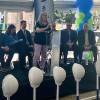Pulse was more than just a gay club — most gay bars are.
Gay bars aren't only places to grab a drink. They are where LGBT people often meet other LGBT people for the first time — where you first get an understanding of community and where you first see people who look like you.
Orlando was my home for about six years while I went to college. Pulse was the first gay club I ever visited, when I was a freshman.
A friend dragged me there. I was so unsure of myself, I even brought a purse, which would be unnatural for me and my gender representation now. But back then I was so clueless about being a lesbian, I thought, "I guess girls carry purses when they go somewhere." So I brought one.
I didn’t know how to be me. But once I was inside I immediately felt welcome. I immediately felt safe. And I immediately felt a sense of community.
This past Sunday, I woke up to a text from my friend Jen. As I write this I’m in New York City, visiting Jen and staying with another friend, Liz. We’re about to see the Dixie Chicks tonight. We’ve been friends since college, in Orlando, and our friendship was solidified on the sticky dance floor of Pulse.
Now, on that same dance floor, a man had shot up the club with an automatic rifle and killed 49 people. The first thing I wondered: How many people at Pulse that night were feeling that sense of community for the first time? How many people would never get the chance to?
Scrolling through my Facebook feed, I learned the shooting happened on Latin night. I went to Latin night lots of times back in Orlando. I understood this would mean the victim list would primarily be comprised of people of color.
When you’re Latino and queer, like me, you’re often made to choose between different parts of your identity. Pulse made a concerted effort to be genuinely inclusive and safe for queer people of color. I went there partly because of that. Most of my friends felt the same way.
When I saw pictures of some of the people who died, I couldn’t process it.
I may never have met them, but I know them. Their names and their faces were just all so familiar.
This last weekend was a stark, horrifying reminder that homophobia and transphobia are dangerously real.
LGBT people across the United States face real discrimination in some of the most benign aspects of their everyday life: at their jobs, in securing housing, and for many, even in interactions with the police. Queer people of color face very real threats of violence almost every day.
Rebecca Marques, second from left, went to college in Orlando and learned to embrace her identity as a gay woman at Pulse, the nightclub where a gunman killed 49 clubgoers.
Facebook/Courtesy
My friends know how much I hate pictures, and therefore how much it took for me to share them. But I was so blown away by how happy I looked in them — they needed to be shared.
When I go see the Dixie Chicks tonight with my friends who knew Pulse, I am hoping to smile like I did in these pictures.
I have so much love for every single person who has helped me on my journey, every single person who shared a shitty Long Island iced tea with me at Pulse, and every person who is still fighting to make sure the next 18-year-old queer feels welcome, safe, supported.
I don’t know how the club will be remembered in the collective American consciousness, but I will choose to remember Pulse for the incredible people I met and the sense of community I felt there.
I don’t know if this will be a catalyst for change like the Stonewall Riots were in 1969. What I do know is that one person won’t ruin what generations have taken to build.
From PRI's The World ©2016 PRI



